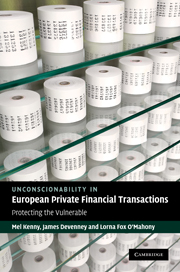Book contents
- Frontmatter
- Contents
- List of contributors
- Introduction: conceptualising unconscionability in Europe
- PART I Conceptualising unconscionability
- 1 Freedom of contract as freedom from unconscionable contracts
- 2 Protection of weaker parties in English law
- 3 Freedom of contract, unequal bargaining power and consumer law on unconscionability
- 4 Loyalty as a tool to combat contractual unfairness: a French perspective
- 5 Unconscionability and the value of choice
- 6 From individual conduct to transactional risk: some relational thoughts about unconscionability and regulation
- 7 An economic perspective on legal remedies for unconscionable contracts
- PART II Conceptualising unconscionability in financial transactions
- Conclusions
- Index
- References
6 - From individual conduct to transactional risk: some relational thoughts about unconscionability and regulation
from PART I - Conceptualising unconscionability
Published online by Cambridge University Press: 06 August 2010
- Frontmatter
- Contents
- List of contributors
- Introduction: conceptualising unconscionability in Europe
- PART I Conceptualising unconscionability
- 1 Freedom of contract as freedom from unconscionable contracts
- 2 Protection of weaker parties in English law
- 3 Freedom of contract, unequal bargaining power and consumer law on unconscionability
- 4 Loyalty as a tool to combat contractual unfairness: a French perspective
- 5 Unconscionability and the value of choice
- 6 From individual conduct to transactional risk: some relational thoughts about unconscionability and regulation
- 7 An economic perspective on legal remedies for unconscionable contracts
- PART II Conceptualising unconscionability in financial transactions
- Conclusions
- Index
- References
Summary
Introduction
In this volume, Stephen Waddams presents a powerful argument that it is impossible to establish an overall rationale which justifies the scope and content of the law of unconscionability. Commentators have particularly focused on wrongdoing by the defendant and absence of consent by the claimant, but it seems these factors, either singly or together, do not provide an adequate basis for the outcomes produced by the application of unconscionability.
In this chapter, the concern is not with the issue of doctrinal rationale, but rather with what I argue is an important but neglected dimension of unconscionability. This is the element of transactional risk – specifically, characteristics of particular kinds of transaction which, in interaction with the conduct of the parties, create unusual risk for one party. The claim is that transactional risk is a variable which is useful in revealing both some fundamental distinctions between different strands of unconscionability doctrine, and also in clarifying important similarities between some strands of unconscionability and the legislative regulation of transactions.
The approach adopted here draws on the relational contract theory developed by Ian Macneil. Although some of the situations where unconscionability is applied concern long-term relationships of the kind where relational theory is usually applied, in this instance the relevance of relational contract theory to transactional context stems from its wider engagement with the role of the social matrix within which all contractual relations – not just long-term ones – take place.
- Type
- Chapter
- Information
- Unconscionability in European Private Financial TransactionsProtecting the Vulnerable, pp. 99 - 128Publisher: Cambridge University PressPrint publication year: 2010
References
- 1
- Cited by



